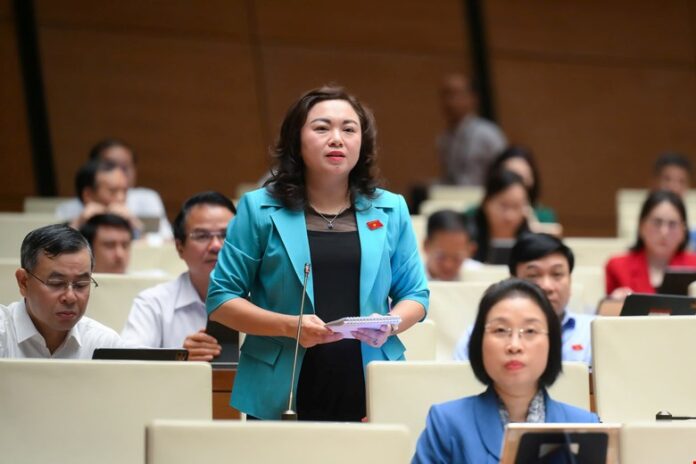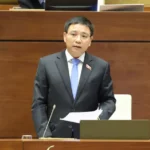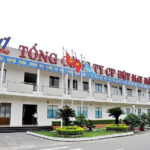As the first delegate to question Minister Nguyen Van Thang, Delegate Dang Bich Ngoc from Hoa Binh Province clearly stated that despite the current challenges and the withdrawal of many businesses from the market, what are the fundamental solutions that the Ministry of Finance is implementing to achieve the goal of 2 million businesses by 2030?
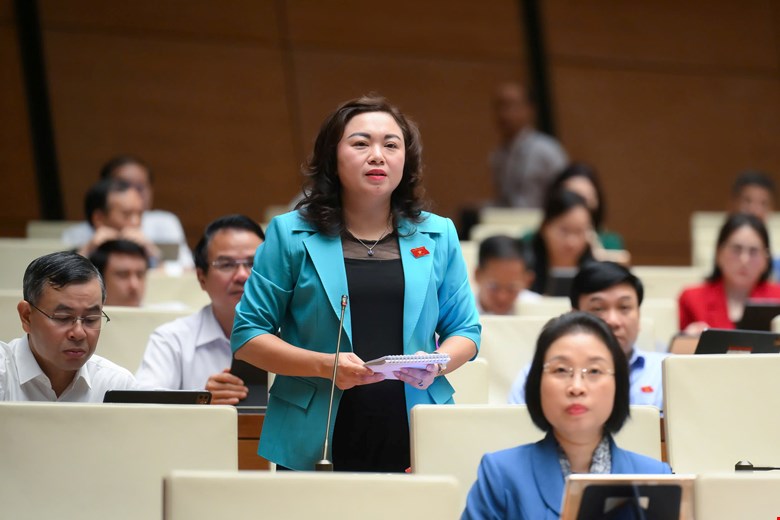
Delegate Dang Bich Ngoc questions the Minister of Finance. Photo: Pham Thang
In response to this, Minister Nguyen Van Thang stated that the goal of reaching 2 million businesses was set forth in the resolutions of the Central Committee, and the National Assembly has also issued a resolution to implement this significant policy.
According to Mr. Nguyen Van Thang, this goal holds great significance, reflecting the economy’s aspiration for growth, but it also presents a formidable challenge due to the challenging business environment. The competitiveness of businesses remains weak.
The head of the Ministry of Finance also acknowledged that the number of businesses withdrawing from the market in the first five months of 2025 poses a significant challenge. Regarding solutions to achieve the goal of developing 2 million businesses, Mr. Nguyen Van Thang stated that first and foremost, there is a need to improve the investment and business environment, reduce administrative procedures, and streamline the process of starting a business.
Additionally, it is crucial to review and address obstacles in investment and business, as well as in planning, to create a transparent and stable framework that motivates enterprises to participate. Promoting digital transformation is also essential.
The leader of the Ministry of Finance also emphasized that there are currently about 5 million operating household businesses in the country, which presents a substantial resource and an important foundation for achieving the goal of 2 million enterprises.
The Ministry of Finance is in the process of refining regulations to narrow the gap between household businesses and enterprises in terms of governance, finance, and accounting, especially by implementing the abolition of lump-sum tax from 2026 onwards, promoting transparency and professionalism.
Participating in the questioning session with the Minister of Finance, Delegate Hoang Van Cuong from Hanoi shared that with the policy of abolishing lump-sum tax from January 1, 2026, many household businesses have expressed concerns.
“Some suggest considering postponing the implementation. These household businesses are not reluctant about paying taxes but are worried about the procedures and technology required. What tax plans and solutions does the Government and the Ministry of Finance have to implement the abolition of lump-sum tax from 2026 onwards to make it more convenient and encouraging for household businesses to pay taxes?” Delegate Cuong asked.
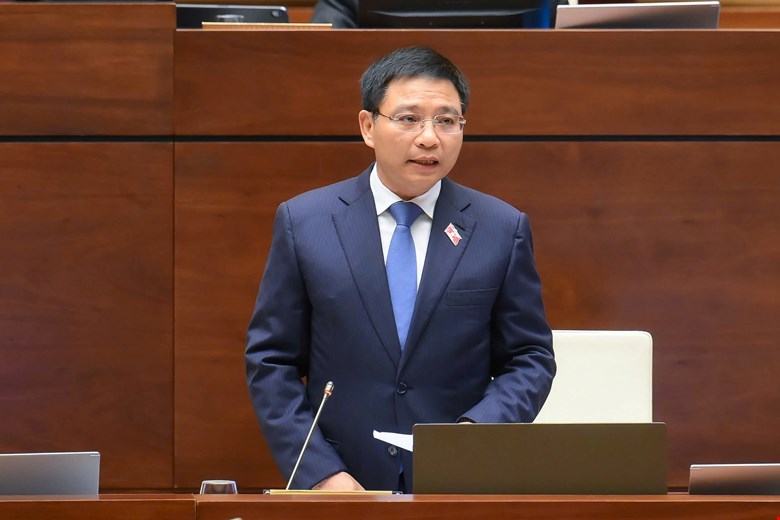
Minister Nguyen Van Thang responds to the questioning on June 19. Photo: Pham Thang
Minister Nguyen Van Thang replied that Resolution 68 of the Politburo on private economic development clearly states that the lump-sum tax mechanism should be abolished by 2026 at the latest. While this mechanism was suitable for a certain period, it has now become outdated and revealed shortcomings, a lack of transparency, susceptibility to abuse, and inequality among different business types. It also fails to motivate household businesses to transform into enterprises.
“Abolishing the lump-sum tax from 2026 onwards is a sound policy of the Party and the State. This fundamental solution is necessary to enhance transparency in the business environment, establish tax equality between household businesses and enterprises, promote the development of enterprise models, and expand the formal economy,” the leader of the Ministry of Finance emphasized.
Mr. Nguyen Van Thang also highlighted that implementing this policy will impact millions of household businesses. The Ministry of Finance is currently preparing legal and technological synchronization for its implementation, aiming to reduce procedural and cost burdens on household businesses.
This includes an ongoing thorough review and improvement of tax policies, proposing amendments to the Law on Tax Administration, the Law on Personal Income Tax, and related regulations, striving for smart tax management, simple and transparent declarations, and easy implementation. Simplification of paperwork and invoices is also a focus to relieve pressure on household businesses during their transition to the new tax management method.
Additionally, the Ministry of Finance will enhance digital transformation in tax management by applying electronic invoices generated from cash registers to ensure accurate and complete revenue collection while reducing costs for household businesses.
Free access to tax declaration, payment, and electronic invoice systems, as well as accounting software, will be provided to support household businesses facing difficulties in the initial phase of the transition. Internal digital transformation will also be promoted to enhance tax management capabilities.
Furthermore, the Ministry of Finance will intensify communication, training, and consulting to help household businesses understand the benefits of transitioning to the new tax management method, as well as provide guidance on electronic invoices, tax declarations, and more.
Today, the National Assembly Questions Finance Minister Nguyen Van Thang.
On Thursday, June 19, the National Assembly will hold a question-and-answer session with members of the Government. The questions directed at Finance Minister Nguyen Van Thang will cover a range of important economic and social issues, including strategies for revitalizing traditional growth drivers and fostering new ones.
Proposed Fine of VND 100 Million for Failure to Issue Invoices or Issuing Invoices Late
to be:
Proposed Penalty of VND 100 Million for Invoicing Irregularities: Late or Missing Invoices
The Ministry of Finance has proposed amendments to Decree 125, suggesting increased penalties for failing to issue invoices or issuing them with incorrect timing. The maximum fine has been proposed to be up to VND 100 million. The draft also includes an expansion of tax officials’ authority to impose penalties and introduces a provision that waives penalties if taxpayers voluntarily rectify their mistakes before detection.
“Ho Chi Minh City Aspires to be a ‘Leading International Metropolis’ in Southeast Asia”
On June 18th, in Ho Chi Minh City, Secretary General To Lam and the Central Working Delegation met with the Standing Committee of the Ho Chi Minh City Party Committee, the Ba Ria-Vung Tau Provincial Party Committee, and the Binh Duong Provincial Party Committee. The meeting discussed the implementation of recent resolutions and conclusions of the Central Committee, organizational restructuring, national defense and security, economic growth, and social welfare.
“Hòa Thọ Textile: Unraveling the Threads of Tax Evasion and Penalties”
In 2023, Dệt may Hòa Thọ was penalized for misdeclaration, resulting in an underpayment of corporate income tax. The company faced financial repercussions, with a fine and additional tax liability totaling almost 825 million VND.


























